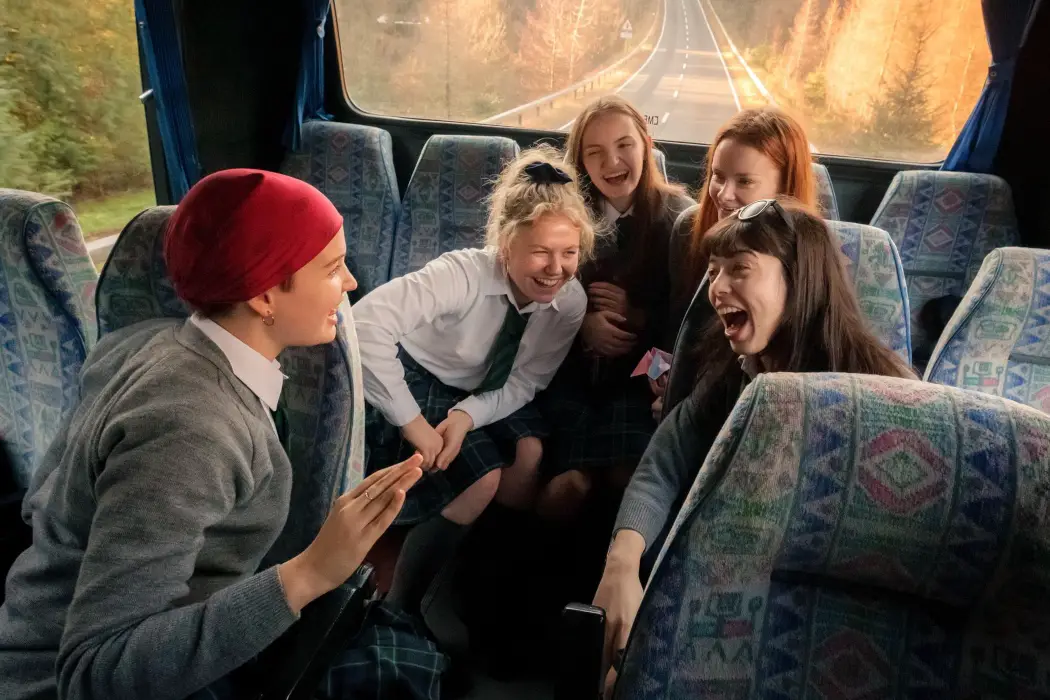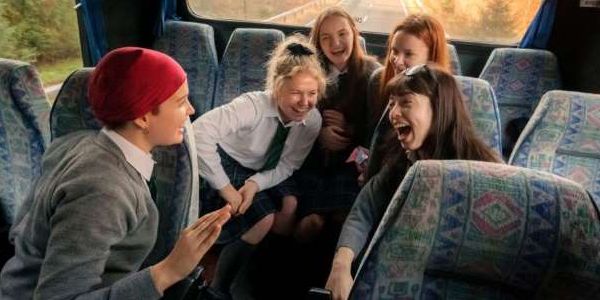LFF 2019: OUR LADIES: A Disappointing Scottish Schoolgirl Coming-Of-Age Tale

All I know is that Oscar Isaac would make a…
Alan Warner‘s 1998 novel, The Sopranos, came just at the wrong time branding wise – Tony, Carmella and the New Jersey family burst onto the small screen and into the cultural conscious just one year later. Hence the renaming of director Michael Caton-Jones‘ adaptation of Warner‘s book to Our Ladies, a title abbreviated from the novel’s 2015 theatrical adaptation, Our Ladies of Perpetual Succour.
Our Lady of Perpetual Succour is the Scottish Catholic school our titular schoolgirls attend. Over the course of one mid-1990s day, the film follows the girls’ trip from their provincial Scottish town to Edinburgh, the big city, where they are competing in a choir competition (hence, The Sopranos). Our ladies, however, are more interested in getting drunk, getting laid and going mental than any boring singing competition.
Director Canton-Jones Must Try Harder
I wanted to like Our Ladies much more than I did. The main thing on the girls’ mind, as with most teenagers, is sex – but the dialogue, laid on thick and clumsy, too often sounds unrealistic, as though written by a middle aged man guessing at how teenage girls speak. Alas, this is the case, with the novel adapted for the screen by Michael Canton-Jones, a middle-aged man seemingly guessing at how teenage girls speak. I sympathise with his task. Story exposition and the revealing insight into your characters becomes a tricky task for the screenwriter when your main characters are teenagers. School kids, with their developing brains, cliques, awkwardness and social mores, do not clearly and succinctly lay out plot points to their best friends; nor do they nonchalantly break social conventions amidst the constant threat of embarrassment from their peers. Canton-Jones therefore has to tread this line carefully and cleverly. He often does not succeed.

When delivering exposition, particularly in the opening scenes, it’s clunky and cringey, leading schoolgirls to state their backgrounds in a way no teenager ever has. When revealing insight into a character, Canton-Jones‘ dialogue results in the 16-year-old girls demonstrating a ridiculous level of precociousness: at one point, head girl Kay (Eve Austin) responds to a sarcastic Fionnula (Abigail Lawrie), ‘Do you always hide behind your jokes?’
The result was several sighs from me due to the lack of realistic language and character via poor observation. Where this year’s Booksmart succeeds in creating a realistic picture of a genuine teenage environment and language, as with the UK TV shows Skins and The Inbetweeners, Our Ladies falls short.
This tone of attempted realism shifts from scene to scene and the mood occasionally seems contradictory even within scenes. The youthful enthusiasm emanating from the girls, backed up by the lively soundtrack jars with static staging, camerawork and editing. Near slapstick events and characters (fireworks lit by a precariously balanced cigarette, creeps at the karaoke) follow discussion of teenage mortality and sexuality in a discordant fashion.

As for the Actresses
The actresses, however, take no share of this blame. To the contrary, each actress brings an individual charm and relatability to their roles and, forcing themselves through the clunky dialogue, come across as real, lived in schoolgirls. From Tallulah Grieve’s Orla to Marli Siu’s Kylah, there is a distinctness in each of their mannerisms that recall schoolfriends with surprising specificity. Rona Morison’s Chell, for instance, I am almost certain I sat next to in maths. Sally Messham’s Manda I definitely used to see on the bus. And with little help from the script, the girls capture loyal female friendship in a way not often seen on screen. This quality alone will no doubt turn the film into a favourite of today’s schoolgirls, like how Superbad’s central friendship became a favourite of schoolboys like me.
And the film does begin to find its feet as the characters’ arcs come to the forefront through the second and third acts. While the distinctness of the girls’ working class, provincial lives doesn’t hit home, the bigger themes, such as Orla’s illness and Fionnula’s sexuality, fare better. And though it occasionally feels as though the well-worn tropes of troubled teenagers are being ticked off with little attempt made at originality, it’s the actresses who sell the emotional resonance of their stories.
Unfortunate Comparisons
No doubt the film found funding due to its similarity to the UK’s popular TV show Derry Girls, which has a near-identical premise, following the daily lives of five Catholic schoolgirls from a provincial city during the mid-1990s. But, like the novel’s unfortunately timed title, Our Ladies similarly feels as if it is arriving at an inopportune time due to the inevitable comparison to the superior Derry Girls. Our Ladies is the Infamous to Derry Girls’ Capote, The Illusionist to Derry Girls’ The Prestige. It suffers by its similarity.

And the reason for Our Ladies‘ unfavourable comparison sadly seems all too simple to pinpoint. Lisa McGee, Derry Girls‘ creator and writer, was herself a Derry schoolgirl: she knows the time and the place, what topics were discussed at the back of the school bus, the lexicon, the slang and types of characters to be found there and only there. Canton-Jones connection to the material appears to start and end with nationality: he’s Scottish. He doesn’t conjure an authenticity on screen that is presumably present in the novel, resulting in the desired authenticity of the time, place and characters lacking at best and feeling false at worst.
A coming-of-age film which strives for irreverent authenticity but ends up clunky, a little cringey and uninspired – to say nothing of the male characters each of whom are awful in their own specific ways – there ultimately is enough to like due to the performances of Lawrie, Siu, Austin, Morison, Grieve and Messham as our eponymous ladies. It’s thanks to them that this adaptation doesn’t fall into Steve Buscemi meme-level cringe.
Watch Our Ladies
Does content like this matter to you?
Become a Member and support film journalism. Unlock access to all of Film Inquiry`s great articles. Join a community of like-minded readers who are passionate about cinema - get access to our private members Network, give back to independent filmmakers, and more.













